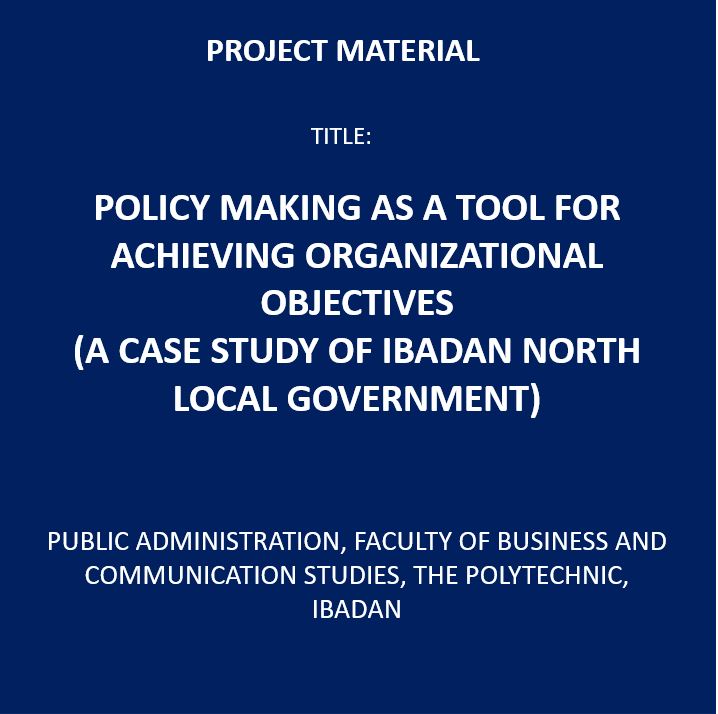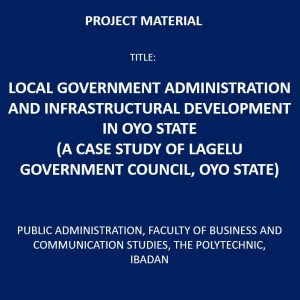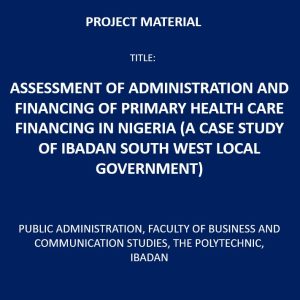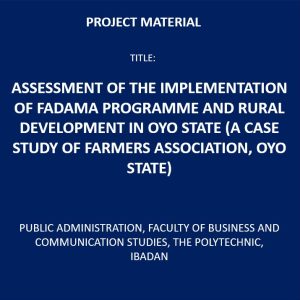No products in the cart.
Policy Making as a Tool for Achieving Organizational Objectives
₦10,150.00
POLICY MAKING AS A TOOL FOR ACHIEVING ORGANIZATIONAL OBJECTIVES
- CASE STUDY: IBADAN NORTH LOCAL GOVERNMENT
- NUMBER OF PAGES: 58
- FILE TYPE: DOC
- DEGREE: HND
- DEPARTMENT: PUBLIC ADMINISTRATION, FACULTY OF BUSINESS AND COMMUNICATION STUDIES, THE POLYTECHNIC, IBADAN
Background to the Study
The task of achieving the objective of an organization is one that has for many years remained a hard not to crack by the management of most organization, and as such left most of the organization either dead or stagnant. The need for policy making arise due to the nature of business firms that opeates in this era. A firm which has originally commenced operations in a single product line catering for a unique set of customer in a limited geographical area, expanded in one or more dimension. Informal control and co-ordinations became partially irrelevant as expansion took place and the need for integrate functional areas arose. This integration functional area arose. This integration brings about framing of policies to guide managerial action. Policymaking became the prime responsibility for effective management system.
The implementation phase in strategic management process consists of a set of activities by which the top management assures that the strategic choice is communicated and related to both the organization and its people. This is to say that implementation encompasses the activity of developing the organizational structure and climate best suited for the implementation of the chosen or adopted policy. This task which is so much important in the life of and organization wishing to survive and to grow cannot be over-emphasized considering the dynamic nature of the world we are in today. However, for management system to effectively carry out this task of achieving the objective of an organization, that management system must aim itself with the tools of policy making and implementation to enable it to adjust to the environment changes surrounding them.
It is the desire and responsibility of every nation in the world including Nigeria to provide for the welfare of its citizens. This is achieved through government designed policies aimed at developing various sectors of the society, and Nigeria having been regarded all over the world as a leading nation in terms of socio- economic and infrastructural development in the entire African continent, has over the years desired to develop the country in the areas of agriculture, education, health care, housing, transportation, communication, technology, infrastructure, commerce, banking, roads, and water among others. In a bid to achieve these needs that might exist at various point in time, government is always confronted with formulating policies to tackle them, aimed at achieving the desired growth and national development for the wellbeing of the citizens. In some situations, these problems are tackled as they arise to avoid degenerating to uncontrollable level (Okoli and Onah, 2002).
Basically, since public policy is the action or proposed action of a government aimed towards achieving desired goals as stated by Ikelegbe (2006), it then means that public policy guides and determines present and future decision as well as private individuals or private business institutional actions, decisions or behavior. As a result of the importance of government providing these facilities especially in the developing countries, the scope and level of public policy is pervasive and influential especially in third world countries such as Nigeria where the private sector is very weak, as such policies determine the activities of government in the provision of services designed to solve problems (Abah, 2010).
Mostly, even though the executive can initiate public policies, but to back it up with enabling laws, policies are made by legislative arm of the government in both the federal, state and local governments, while the implementation lies with the public bureaucracy (Ezeani, 2006). The study therefore intends to examine policy making and implementation as a tool for efficient management to achieve the objective of an organization with specific focus on Ibadan North Local Government.






